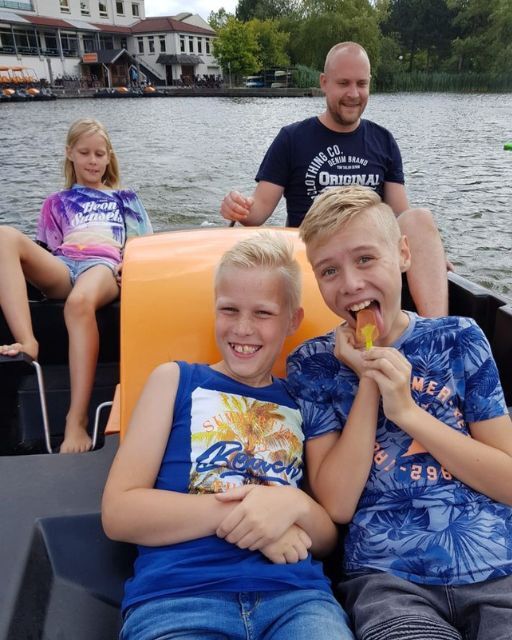That weekend felt almost magical—no phones, no distractions, just the five of us in a pedal boat, floating across the lake like we used to as kids.
The twins were in the front, splashing and laughing. I lounged in the back, half-listening, half-watching Dad pedal with that quiet, contented smile. But something was… off.
He kept checking his watch. Not once or twice—constantly. Like he was racing against time only he could feel.
“Dad, relax,” I joked. “We’ve got nowhere else to be.”
He smiled, but didn’t respond.
Even as we headed back to shore and the sun sank lower, I couldn’t shake the feeling. He seemed present, but somehow distant—like part of him wasn’t really there with us.
I chalked it up to stress or maybe just age, not wanting to ruin the rare family moment with worry. But later that night, around the firepit, it was even more obvious. He was quieter. More withdrawn. And still checking his watch.
“Dad, is something wrong?” I asked gently.
He exhaled slowly. “No, just keeping track of time.”
The answer didn’t sit right. He wasn’t being himself, and we all felt it.
That night, I heard him moving around in the kitchen, like usual, making tea. But it felt rushed, purposeful. Like he was waiting for something.
The next morning, he was gone. The kitchen was buzzing—Mom cleaning up, the twins bickering—but Dad’s seat was empty.
Then I saw it: his watch, the one he’d been glued to all weekend, sitting untouched on the counter.
I picked it up and turned it over—and there it was. An inscription: “To my dearest Jane, Always waiting for you.”
Jane?
I’d never heard that name before.
Just then, Mom walked in and saw the watch in my hand. Her face went pale.
“You need to sit down,” she said softly.
What she told me unraveled everything I thought I knew about Dad.
Before he met Mom, before we were born, there had been someone else. Jane. They were engaged. But a car accident took her life, and Dad had never fully moved on. He’d carried her memory—and his promise to wait for her—with him all these years.
He had loved us. He does love us. But part of him had always been somewhere else, still grieving, still holding on.
When he returned later that day, I sat with him on the porch.
“I know about Jane,” I said.
He turned to me, eyes heavy with emotion. “I’m sorry. I didn’t know how to let go.”
We sat in silence. Not everything needed words.
“I just wish you’d told us,” I said eventually.
“I didn’t want you to feel like you weren’t enough,” he whispered.
It hurt—but I understood. He wasn’t perfect. He was human. And humans carry invisible scars.
From that day on, he started opening up more. Slowly, we began to heal—not by forgetting the past, but by making room for the future.
Life rarely unfolds the way we expect. People carry stories they never tell. But love—real love—makes space for truth, no matter how long it takes to surface.
If this touched something in you, or if you’ve ever lived with unspoken stories, share this. Because sometimes, understanding each other starts with simply asking what we’ve been carrying all along.
